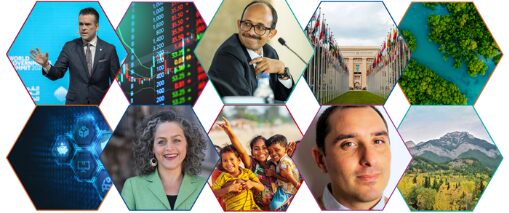
Financing for a Riskier Future
This is a hybrid event, featuring both in-person and virtual components.
- Register for the in-person session below.
- Register for the virtual session here.
Disasters and shocks—both climate-related and otherwise—are increasing in frequency, intensity, and complexity, posing escalating threats to sustainable development worldwide. According to the 2025 Global Assessment Report on Disaster Risk Reduction, direct disaster losses now average between $180 and $200 billion annually. When cascading effects and ecosystem impacts are included, the true global cost exceeds $2.3 trillion per year. These systemic risks are reversing development gains, stretching national capacities, and challenging the international system’s ability to respond.
While the costs are significant, the benefits of investing in resilience are well-established. Disaster Risk Reduction (DRR) measures deliver some of the highest benefit-cost ratios in development investment, ranging from 2:1 to 10:1 or more. Nevertheless, investment remains far below what is needed. The UNEP Adaptation Gap Report 2024 estimates an annual financing shortfall of US$187 billion to US$359 billion, highlighting the urgent need to close this gap to avoid increasingly unmanageable financial and economic consequences. The Fourth International Conference on Financing for Development (FFD4), held in 2025, further underscored the urgent need to scale up investment in DRR and climate adaptation financing. Addressing this challenge requires the active engagement of scientists, policymakers, academic institutions, and other stakeholders to co-develop new, evidence-based financing solutions that can be scaled and sustained.
This event, co-hosted by the Columbia Climate School, the National Center for Disaster Preparedness (NCDP), and the United Nations Office for Disaster Risk Reduction (UNDRR), will explore how science, policy, and academia can help bridge the resilience financing divide. It will feature a keynote by Mr. Kamal Kishore, Special Representative of the Secretary-General for Disaster Risk Reduction; highlight new tools developed by NCDP to better target finance to the countries that need it most; and showcase Columbia’s academic leadership in training the next generation of climate and resilience professionals.
Speakers
- Keynote speaker: Kamal Kishore, Special Representative of the UN Secretary-General for Disaster Risk Reduction and Head of UNDRR
- Jeff Schlegelmilch, Associate Professor of Professional Practice in the Faculty of Climate, Director, National Center for Disaster Preparedness (NCDP), Director of Executive Education and Non-Degree Programs, Columbia Climate School
- Lisa Dale, Senior Lecturer in Climate; Director, MA Climate + Society
- Moderator: Andrew Kruczkiewicz, Senior Researcher, Columbia Climate School, National Center for Disaster Preparedness
- Interactive Question and Answers
- Closing Remarks




